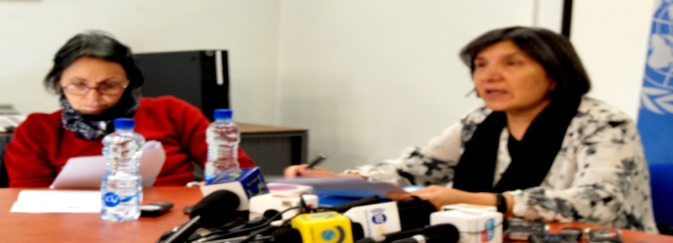AT News Report
KABUL: A United Nation Special Rapporteure who recently came to Afghanistan and quested over violence against women, said that despite 13 years of governance, so far different manifestations of violence against women and girls exist in the country and women seriously suffering from insecurity and gender climate fear.
Speaking at a press conference here on Wednesday, Rashida Manjoo the UN Special Rapporteure said the multiplicity of normative systems in the country favors the power structures intent on oppressing women in the private sphere and in public life, facilitates impunity, an presents a significant obstacle for women and defenders of women’s rights.
She emphasized that Afghan government has legal international obligations to meet, as set out in, among other treaties, the Convention on the Elimination of All Forms of Discrimination against Women and the Convention on the Rights of the Child. �“The state has a responsibility to act with due diligence to eliminate all forms of violence against women and girls. This responsibility includes the protection, prevention, investigation, punishment, and provision of effective remedies, including compensation measures. Furthermore, the state has a responsibility to hold accountable not only the perpetrators of violence, but also state authorities who fail to protect and prevent the violations of women and girls human rights, due to a lack of response or because of ineffective responses,” she said.
Manjoo during her nine days mission in Kabul, Nangarhar and Herat provinces found out that self-immolation, forced marriage, exchange marriages due to domestic violence and sexual harassment at work places are the most complicated violence against women.
She said based on the interviews access to justices for women and girls was a source of deep concern. Quoting interlocutors she said that justice system was deficient for women in many cases. The justice system was not accessible, unresponsive, corruption and untrustworthy, especially about women rights, Manjoo added.
According to the UN Special Rapporteure due to lack of attention in formal justices and social pressures women seek another informal option like Jirga and Shura for resolution of disputes, but they were also deficient regarding to domestic violence.
Another challenge that she indentified is the issue of the lack of effective interpretation and implementation of relevant laws by government authorities particularly the Elimination of Violence against Women Law (EVAW).
“I visited the Badam Bagh Prison in Kabul and the Juvenile Rehabilitation Center in Herat province where I interviewed several convicted and pre-trial detainees. Some interlocutors revealed that they had been subjected to physical and sexual violence prior to incarceration, which had led to them ‘running away from home’. Many interviewees stated that crimes linked to them leaving home, including conviction for the crime of zina, assault and murder has led to conviction and custodial sentences,” she said.
 Afghanistan Times
Afghanistan Times




